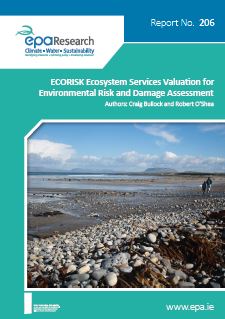Authors: Craig Bullock and Robert O’Shea
Summary: ECORISK had the objective of exploring methods whereby the valuation of social and economic impacts could be used to supplement established methods of environmental damage assessment for the purposes of remediation.

The Environmental Liability Directive (2004/35/EC) (ELD) applies a common liability approach to instances of environmental damage to land, water and protected species and habitats throughout the European Union. It aims to prevent and remedy environmental damage by holding those responsible financially liable for remediation. The objective of ECORISK has been to explore methods whereby the valuation of ecosystem services can be used to supplement established methods of environmental damage assessment.
As well as adverse impacts on the natural environment, environmental damage can also have an impact on human health and well-being. This report takes the concept of ecosystem services and focuses specifically on water and the importance of functioning aquatic ecosystems for economic and social well-being, the assimilation of waste, and the provision of water that is safe for recreation and human or animal consumption.
The ELD allows for primary restoration, complementary remediation, and compensatory remediation. Primary restoration is the first priority, but there may be a need to consider complementary remediation with replacement habitat where this is not possible, and/or compensatory remediation to account for interim losses, including services to human beings who may depend on, or value, aspects of the impacted environment. The report introduces the concept of resource equivalency using resource-to-resource, service-to-service and value-to-value approaches. It discusses the economic methods that are available to value the loss of ecosystem services due to adverse environmental impacts. These are relevant to determining the extent of liability and the resources that need to be invested in remediation of the environment to a level equivalent to the full social value of the resource and services that have been lost. It can be expected that there will be a distinction between the value of the original and remediated environment that implies that remediation should extend beyond simple replacement.
https://www.epa.ie/media/epa-2020/publications/research/Thumb-206[1].jpg